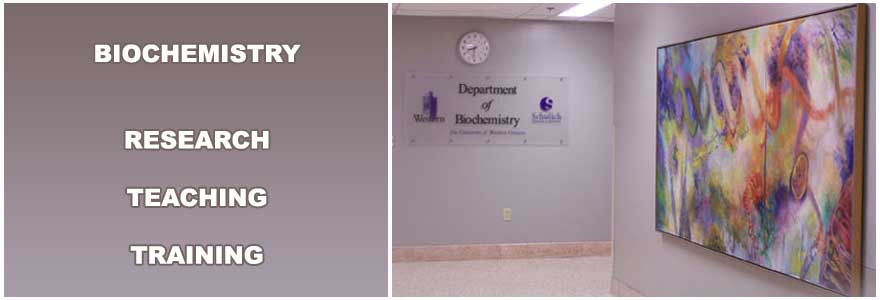- Home
- About Us
About Us
We invite you to explore our website to learn about
our dynamic research and teaching enterprise in the Department of Biochemistry!
Our Commitment to Equity, Diversity, Inclusion, and Decolonization (EDID)
The Dept. of Biochemistry recognizes and values equity, diversity, and inclusion (EDI) principles across all aspects of its functioning. We are committed to fostering an inclusive environment that celebrates diversity and provides equitable outcomes for our students, post-doctoral scholars, staff, and faculty. We are also committed to promoting decolonization (D) within our curricula. See our equity, diversity, inclusion, and decolonization webpage for more info.
Our Goals
First established in 1924, our Dept. has grown tremendously to form a vibrant community of faculty, research personnel, students, and administrative staff. To maintain our long-standing tradition of excellence, we strive to...
- Advance scientific discoveries through our successful research programs,
- Participate in the scientific education of undergraduate students,
- Provide high-quality research training for graduate students and post-doctoral researchers, and
- Promote equity, diversity, and inclusion (EDI) in the research, teaching, and operational aspects of the department.
We aim to create an exceptional research and teaching environment in order to inspire the next generation of scientists and educators.
Our Location
The Dept. is a core unit of the Schulich School of Medicine & Dentistry and is located in the Medical Sciences Building on the main campus. Additional faculty offices and research labs are found in the Siebens Drake Research Institute, Robarts Research Institute, and London Health Sciences Centre. See Western maps.
Our Research
Our research faculty comprise a diverse, multi-disciplinary community that effectively advances research discoveries. Our scientists have expertise in the following areas:
- genome dynamics, epigenetics, and gene expression
- human genetics and clinical biochemistry
- signal transduction and intracellular communication
- macromolecular structure and dynamics
- proteomics
- bioinformatics
Productive collaborations within our research community and beyond have been vital to accelerating our research successes. In addition, our research facilities provide essential services for advancing our work.
Our Seminars
To promote research interactions and disseminate scientific knowledge, our Dept. hosts a weekly Visiting Speaker Seminar Series. In addition, the Dr. Maud L. Menten Memorial Lecture Series features seminars from high-profile scientists. We also have Graduate Student Research Symposia to provide our students with opportunities to speak about their research.
Our Students and Post-doctoral Scholars
Scientific education of students and trainees is a valuable Dept. initiative.
- At the undergraduate level, teaching encompasses biochemistry courses for biology, chemistry, and biochemistry programs, as well as for dental and medical students. We offer undergraduate Honors, Majors, and Minors in Biochemistry, as well as joint specializations with other sciences.
- At the graduate level, our programs include state-of-the-art research training leading to thesis-based MSc and PhD degrees.
- At the post-doctoral level, we offer excellent research training and access to research facilities.










